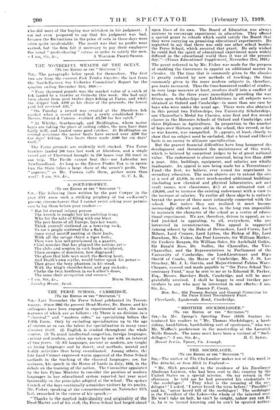THE PERSE SCHOOL, CAMBRIDGE.
[To TIM EDITOR or THE SPECTATOR.")
November the Verse School telebrated its Tercen- tenary. Since 1902 the present Head-Master, Dr. Rouse, and his colleagues have been engaged in experimental work, the main teatures of which are as follows (I) There is no division iota "classical" and "modern sides," no specializing before the •
Fifth. Form. Only by excluding specialization sip to the ago sf sixteen or so can the talent for specialization in many cases discover itself. (2) English is studied throughout the whole course. (3) To avoid intellectual congestion, foreign languages. student and modern, are taken up one by one with an interval of two years. (4) All languages, ancient or modern, are taught s.s living languages and by direct, oral methods, mental and liedily activities thus being co-ordinated. Among others, the late Lord Cromer expressed warm approval of the Verse School methods in the teaching of the classical languages; see, for instance, his speech in the House of Lords in July, 1916, in the debate on the training of the nation. The Committee appointed by the late Prime Minister to consider the position of modern languages in our educational system reported last year mast favourably on the principles adopted at the school. The spoken French of the boys continually astonishes visitors by its purity. Mr. Fisher, speaking at the commemoration on November 15th last, remarked in the course of his speech:—
"Thanks to the marked individuality and originality of the tread-Master and of his staff, the Verse School had forged ahead
upon lines of its own. The Board of Education was always anxious to encourage experiment in education. They offered a special grant to schools which could satisfy the Board that they were carrying on promising educational experiments. He regretted to say that there was only one other school besides the Perse School, which received that grant. He only wished he could find the spirit of educational experiment more widely diffused in the educational world than it was at the present day."--(Times Educational Supplement, November 21st, 1918.) The grant referred to by Mr. Fisher was made for the purpose of enabling the Governors to appoint an additional master in classics. (5) The time that is commonly given to the classics is greatly reduced by new methods of teaching; the limo commonly given to the more modern subjects is, therefore. pro tanto increased. Thus the time-honoured conflict of studies, in very large measure at least, resolves itself into a conflict of methods. In the three years immediately preceding the war fifteen open Scholarships and Exhibitions in all subjects were obtained at Oxford and Cambridge—in more than one ease by boys who were under the usual age. There were also obtained in this period two Fellowships, two University Scholarships. one Chancellor's Medal for Classics, Hine first and five second classes in the Honours Schools of Oxford and Cambridge, and three Diplomas in Agriculture. In proportion to the number of boys over thirteen years old in the school, this record, so far as was known, was unequalled. It sppears, at least, clearly to show that no subject need be excluded, that n broad and liberal basis is no enemy to ultimate specialization.
But the gravest financial difficulties have long hampered the development and threatened the maintenance of this work, which is believed by competent judges to be of great national value. The endowment is almost nominal, being less than 8400 a year. Site, buildings, equipment, and salaries are wholly inadequate. An appeal is now being made for a Tercentenary Fund—the first, we believe, ever issued for experiment in secondary education. The main objects aro to extend the site at a cost of 15,000, to erect much-needed additional buildings (including new chemical and physical laboratories, art aril craft rooms, nen- classrooms, Ac.) at an estimated cost cf .t20,000, and to increase the existing endowment with a view to the increase of salaries. To realize all these objets is entirely beyond the power of those most intimately connected with the school. But sunless they are realized it must became increasingly difficult and, we fear, in the long run impossible to maintain the character of the school as a centre of educa- tional experiment. We are, therefore, driven to appeal, as we feel justified in appealing, to all, everywhere, who are interested its reconstruction. This appeal is supported (among others) by the Duke of Devonshire, Lord Crewe, Lord Milner, Lord Cromer, Lord Lytton, the Bishop of Ely, Lord Burnham, Mr. Fisher, the Poet Laureate, Sir William Mather. Sir Frederic Kenyon, Sir William Oster, Sir Archibald Geikie, Sir Ronald Ross, Dr. Sadler, the Chancellor, the Vice- Chancellor, and the Representatives its Parliament of the University of Cambridge, the Lord-Lieutenant and Riga Sheriff of Combs, the Mayor of Cambridge, Mr. J. St. Lois Strachey, Mr. J. L. Garvin, and Major-General Fabian Ware. Cheques, crossed and made payable to "the Verse School Ter- centenary Fund," may be sent to me or to Edmund H. Parker, Esq., Messrs. Barclays Bank, Cambridge, and will be most gratefully received. I shall be hnppy to send further par- ticulars to any who may be interested in our efforts.—I am, Ron. Sec., Old Persean Society and General Committee for the Terse School Tercentenary Fund.
Clerelande, Lyndetrode Road, Cambridge.


































 Previous page
Previous page